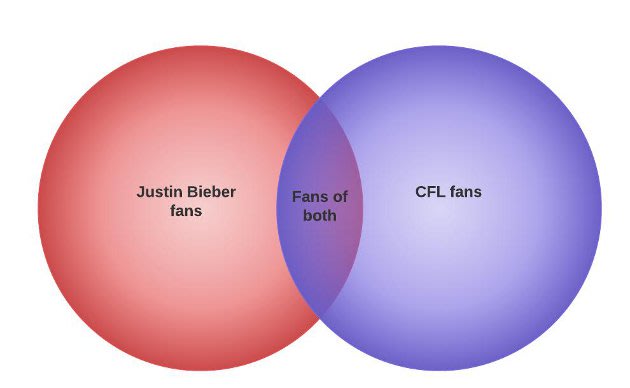Justin Bieber playing Grey Cup halftime suggests CFL wants young fans: will it work?
 Will Justin Bieber's performance at halftime add any new CFL fans?Saturday's announcement that this year's Grey Cup halftime show will feature Justin Bieber (as well as the less-controversial Carly Rae Jepsen, Gordon Lightfoot and Marianas Trench) has already sparked plenty of interesting reactions, from Elliotte Friedman's "Rogers Centre to overflow with ear blood" to enthusiastic people plotting out potential set lists. Leaving aside the debate over the musical abilities of Bieber, though, what's interesting is that for the second year in a row (hello, Nickelback!), the CFL has gone with an act that's both extremely popular with groups outside the league's primary fan demographics and reviled by many inside those demographics. Of course, this year they've dialed that down by having Bieber share the stage with Jepsen, Lightfoot and Marianas Trench, so there's probably something just about everyone can at least tolerate here. That raises its own questions of if trying to hit every box is the right strategy, though. Expanding the league's fan base is certainly a laudable goal, but is this approach going to do it?
Will Justin Bieber's performance at halftime add any new CFL fans?Saturday's announcement that this year's Grey Cup halftime show will feature Justin Bieber (as well as the less-controversial Carly Rae Jepsen, Gordon Lightfoot and Marianas Trench) has already sparked plenty of interesting reactions, from Elliotte Friedman's "Rogers Centre to overflow with ear blood" to enthusiastic people plotting out potential set lists. Leaving aside the debate over the musical abilities of Bieber, though, what's interesting is that for the second year in a row (hello, Nickelback!), the CFL has gone with an act that's both extremely popular with groups outside the league's primary fan demographics and reviled by many inside those demographics. Of course, this year they've dialed that down by having Bieber share the stage with Jepsen, Lightfoot and Marianas Trench, so there's probably something just about everyone can at least tolerate here. That raises its own questions of if trying to hit every box is the right strategy, though. Expanding the league's fan base is certainly a laudable goal, but is this approach going to do it?
Of course, demographics never tell the entire story. The CFL undoubtedly has some fans of every age and gender, as does Bieber. Moreover, there are certainly teenagers who hate Bieber and love the CFL, and it's at least possible that there are a few adults who won't watch the CFL but enjoy Bieber's music (I don't know any, though). However, while target demographic analysis is a long way from being comprehensive and never represents everyone, that doesn't mean it should be ignored entirely; what it does is provide you with a general idea of who's interested in what.
This is why the concept of a median fan (line every fan up by what demographic you're looking at, pick the middle fan) can be more useful than the idea of an average fan (add up, say, fans' ages, divide by the total number of fans); for one, it's less affected by results at the ends of the spectrum. For example, if you had five Bieber fans of ages 15, 16, 17, 18 and 85 (a grandmother who likes her grandkids' music, I guess?), the median would be 17, but the average (or mean) age! would be! 30.2, and those would lead you to rather different conclusions ("Teenagers like Justin Bieber!" "No, 30-year-olds like Justin Bieber!").We don't have a marketing research firm on staff here at 55-Yard Line, so we can't do this by the actual numbers, but based on what's out there, wouldn't it seem likely that Bieber's median fan is probably a teenager, while the CFL's median fan is probably at least 30? For example, when talking CFL TV ratings earlier this year, Bruce Dowbiggin focused on the demographic of adults aged 25-54; it's hard to imagine a similar focus for those analyzing Justin Bieber.Again, that's not to say there's no overlap between the groups, as there definitely is some. It's just it would seem to be rather small, as portrayed in this completely unscientific Venn diagram:
 There wouldn't seem to be much overlap between fans of Justin Bieber and CFL fans.
There wouldn't seem to be much overlap between fans of Justin Bieber and CFL fans.
Regardless of how small or large that purple middle circle actually is, though, the CFL's goal here is clear: turn red Bieber-only fans into purple Bieber-and-CFL fans. That's not a bad goal; growing your fanbase is crucial as a league. The question is if featuring Justin Bieber will actually bring an! y more fa! ns to the league, though. Are Bieber-only fans really going to turn into CFL fans just because he played the halftime show? Are they going to even watch the rest of the game? If they do so in significant numbers, then this gamble may pay off. From this corner, though, the odds of that seem steep.